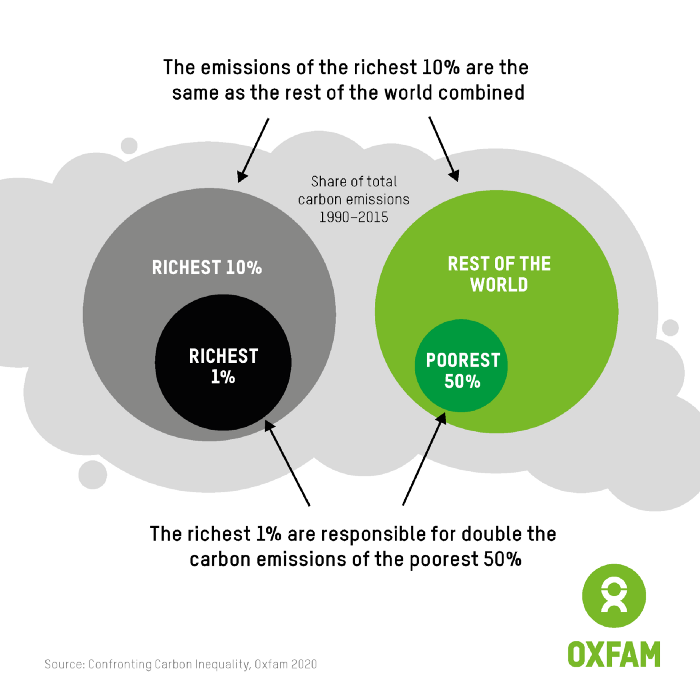Today, the world’s human population is around 7.9 billion. That’s increased from around one billion in 1800, although the rate of growth has been falling since the sixties.
Some people suggest that the best (or only) way to reduce the damage humans do to the environment is to reduce the human population.
But the evidence shows that wasteful overconsumption – driven mostly by the richest people and societies – causes far more damage. From a moral and practical perspective, it’s also a much easier problem to solve.
Many of the people who raise concerns about population are well-intentioned. But the idea that overpopulation is causing climate change is inaccurate, and unfairly places blame on poorer societies in the global south. These societies have faster-growing populations, but much lower consumption. This argument also diverts attention from the much greater responsibility of richer societies in the global north to reduce their emissions.
Because most people in the global south are people of colour, there is a racial justice dimension to population control argument. Regardless of the intention, it can reinforce racist attitudes and feed long-standing racial inequality and injustice.
Is population growth causing climate change?
The causes of climate change and biodiversity loss are well documented, and are down to human consumption of energy, food, and other natural resources. However, consumption of resources varies greatly in different parts of the world.
Each person in Australia, for example, has an average carbon footprint of around 15 tonnes per year. The figure in Mali is just 0.17 tonnes. In just over four days, the average Australian emits as much as the average Malian does in a year. It takes just under two weeks for an average person in the UK to emit as much as the average Malian does in a year.
The figure for China is higher than the UK, at 7.41 tonnes per person. This is due to the difference in the two countries’ energy mix between renewables and coal, and is complicated by the fact that China produces a huge quantity of goods for the rich world.
But the general picture holds true: the average carbon footprint of people in high consuming countries* is far higher than in low-consuming countries, where most population growth is happening.
If we’re concerned about the climate, then overconsumption of resources (and resulting carbon pollution) is the main problem to solve.
Won’t more people consume more resources?
Yes – more people, especially in rich countries, would consume more resources. But populations in most rich countries have stabilised or are even declining, thanks to better education and reproductive care.
Consumption also varies within countries. On average, the very richest will consume much more than the poorest. Recent reports have found that the wealthiest 10% of the world’s population – some 630 million people – were responsible for over half of all emissions between 1990 and 2015. And because life expectancy is generally higher in richer countries, we don’t just consume more day to day – we do it for longer too.
But overall, the evidence at the country level shows that climate change and biodiversity loss are more the consequence of above-average (and highly unsustainable) consumption in rich countries – not by an increase in overall population levels of poorer people in the global south.
Therefore, reducing the consumption of the richest would be more effective in combating the climate and biodiversity crises than reducing population growth.

A small number of extremely rich people produce more carbon pollution than billions of the world’s poorest people. Oxfam
How does Greenpeace UK campaign on this?
We don’t support population control in the global south as a legitimate solution to the climate and nature crises.
Campaigning for population control, while doing little to propose reductions in consumption in the richest countries, would be unfair and ineffective.
Instead, Greenpeace UK campaigns to stop the overconsumption of plastic, fossil fuels, industrial meat and so on. And we work to create a fairer, zero-carbon global economy.
This might include getting rich-world governments to help less wealthy countries build more locally-owned renewable energy. This would allow governments to give their people a better life without relying on harmful fuel sources like fossil fuels or wood.
Greenpeace UK has made a commitment to anti-racism in its operations and campaigning. We recognise the link between racism and environmental destruction.
Of course, not everyone who talks about population is motivated by racism. But there is a clear racial dimension to this issue, and racist political movements are some of the biggest proponents of these arguments.
What about reproductive rights?
Some people call for better reproductive rights as a way to reduce population growth and pressures on the environment. And it’s true that improving access to education and family planning resources helps people have fewer children.
But as a progressive, values-based organisation, we support reproductive rights on their own merits. They shouldn’t be a means to an end, or a way to sanitise more coercive approaches to population control.
So we’ll continue to focus on the fairest and most effective way to tackle climate change: reducing wasteful overconsumption and championing sustainable solutions.



